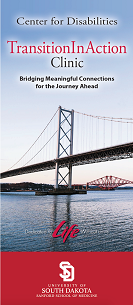The TransitionsInAction Clinic
April 14, 2016

|
Richard Parent-Johnson, Ph.D. & Wendy Parent-Johnson, Ph.D.
Emily Meier, M.A., Caitlin Borges, M.S.W., Lingling Mai, M.D., & Pat Herman, MURP
In response to the growing need and demand for transition services by adolescents with disabilities and/or chronic health conditions, the University of South Dakota Center for Disabilities is now offering a new clinical modality-the TransitionsInAction Clinic.
The TransitionsInAction Clinic is a multi-disciplinary, daylong comprehensive clinic designed to assess an adolescent's (and their family's) current "status" and future goals in the major life areas of 1] health care, 2] education and 3] employment as they plan their transitions to adulthood. Beyond initial assessments, this clinic also provides a set of recommendations for "next steps" as they relate to successful transitions in these three areas.
The TransitionsInAction Clinic purposefully develops a plan of action that emphasizes a comprehensive, coordinated, individualized transition process that results in an integration of meaningful connections. Through a series of activities and discussions, the adolescent/young adult and their family/caregivers are assessed in terms of their levels of knowledge, participation, competency, and planning as they relate to the overall transitioning processes.
This multi-disciplinary clinic includes interviews, assessments, discussions, and activities with medical, education, rehabilitation, and adult service personnel. Included among the unique and important features of the clinic are the addition of mini work experiences through three situational assessment opportunities, participation in a guided health care transition simulation (Transition Engagement Guide), an introduction to "Doc Talk"-a tool for patient/doctor interaction, as well as discussions with parent and peer mentors.
Professionals in the adult service system are also integral in assisting with a smooth transition ensuring that services are uninterrupted and that planning continues in all areas. For this reason, outside community agencies are invited to participate in the clinic to discuss services and resources available to the young adult. Agencies that currently partner in the clinic experience are the parent training organization, independent living services, vocational rehabilitation, community support provider employment program, a benefits specialist, and a school and adult service transition liaison.
Clinic activities result in a set of concrete recommendations that facilitate both the youth and the family/caregiver in their mutual development of effective transition goals and practices. Resources and a clinic report highlighting recommendations are provided to enable sharing this information with other key people involved in the young person's transitions. It is suggested that transition issues and "transition plans" be revisited and updated regularly.
TransitionsInAction Clinics have received positive feedback from participants. One parent stated: "I hope...that other families will have this wonderful experience and to provide another young person the opportunity to use this great resource to assist them as they transition to the adult world. I highly recommend it! A++" Another parent stated that, because of the clinic experience: "(My daughter) has become a different person; she's trying more (new things) and is more independent. She seems older."
This innovative clinic is offered by the University of South Dakota Center for Disabilities on a monthly basis. Young adults between the ages of 17 and 21 who have significant, chronic health care needs with or without a disability are eligible for participation. If you have any questions or would like additional information, please contact Emily Meier at [email protected] or (605)357-1475 or Wendy Parent-Johnson at [email protected] or (605)357-1468.
Development of the TransitionsInAction Clinic is supported by funding from: 1) the Heartland Genetics and Newborn Screening Collaborative, through a grant from the Genetic Services Branch of the Maternal and Child Health Bureau (MHCB) of the Health Resources and Services Administration (HRSA), Grant Number H46MC24089; and 2) the University Center on Excellence in Developmental Disabilities funded by the Administration on Intellectual and Developmental Disabilities, Administration for Community Living of the U.S. Department of Health and Human Services, Grant Number 90-DD-0704-02-00.







